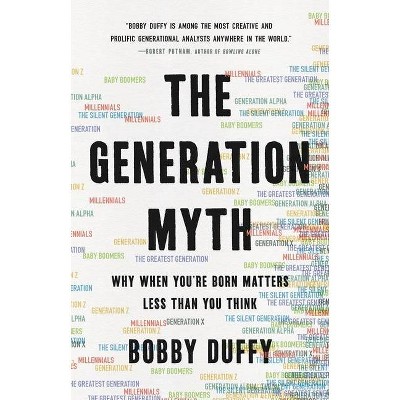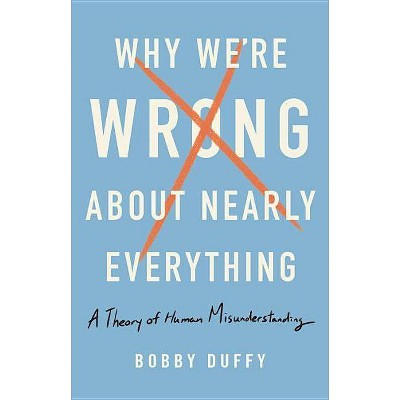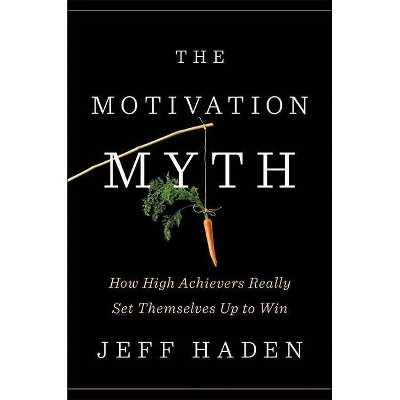The Generation Myth - by Bobby Duffy (Hardcover)

Similar Products
Products of same category from the store
AllProduct info
<p/><br></br><p><b> About the Book </b></p></br></br>"One of the simplest and most powerful ways we understand people is as members of a generation. Your uncle is a bit racist because he's a baby boomer; your gen x boss is not a good team player; your cousin is constantly trying to go viral because he's gen z, and his generation is obsessed with fame. We also use generations as a tool for tracking how a society's values change over time (baby boomers liberated sex; millennials made it problematic), and how to appeal to the generations that hold them. What we assume when we talk about generations is that our values and habits are fixed by the time we turn 18, and that generational conflict is inevitable: a generation matures into adulthood and takes control of our artistic, commercial, and political tastes, which then become obsolete and are replaced by succeeding generations. It's a compelling story - after all, it is natural to think you have more in common with your peers than with your parents. But it is also wrong. Bobby Duffy has spent decades studying how social values and beliefs change. In The Generation Myth, he argues that generations do not have fixed or monolithic identities, nor is one unavoidably distinct from all the rest. Rather, generational identities are fluid, forming and reforming throughout life. Gen xers aren't just a product of the Reagan years - their values have been shaped equally by the Iraq War, two financial collapses, and the simple fact that they have gotten older A generation isn't an identity as much as a process. Duffy shows that differences between generations aren't nearly as sharp as we think. Political engagement, for example, has not declined in younger generations - younger people are always less politically active. Older generations have different expectations of their employers than younger generations simply because they entered different labor markets. Baby boomers had more sex in their youth than millennials, but millennials are actually happier with their sex lives. Young adults are no likelier to buy a product based on the company's ethics than their parents or grandparents. Through these insights, we find not only a truer picture of real generational differences, but a better way of understanding how societies change, and where ours may be headed. An analysis of breathtaking scale, based on data collected from over three million people, The Generation Myth is a vital rejoinder to alarmist books like iGen, The Coddling of the American Mind, and A Generation of Sociopaths. The kids are alright. Their parents are too"--<p/><br></br><p><b> Book Synopsis </b></p></br></br><p><b>Millennials, Baby Boomers, Gen Z--we like to define people by when they were born, but an acclaimed social researcher explains why we shouldn't.</b></p><p>Boomers are narcissists. Millennials are spoiled. Gen Zers are lazy. We assume people born around the same time have basically the same values. It makes for good headlines, but is it true? <p/>Bobby Duffy has spent years studying generational distinctions. In <i>The Generation Myth</i>, he argues that our generational identities are not fixed but fluid, reforming throughout our lives. Based on an analysis of what over three million people really think about homeownership, sex, well-being, and more, Duffy offers a new model for understanding how generations form, how they shape societies, and why generational differences aren't as sharp as we think. <p/><i>The Generation Myth</i> is a vital rejoinder to alarmist worries about generational warfare and social decline. The kids are all right, it turns out. Their parents are too. </p><p/><br></br><p><b> Review Quotes </b></p></br></br><br>"Bobby Duffy is among the most creative and prolific generational analysts anywhere in the world. Duffy's scientific approach enables him to discount the glib generational stories that obscure our understanding at the same time that he spots deeper generational truths. These virtues make this book indispensable both for national leaders trying to navigate their countries through today's unpredictable political currents and for ordinary citizens trying to navigate themselves and their families through uncertain times."--<i><b>Robert Putnam, author of Bowling Alone</b></i><br><br>"Bobby Duffy shows that <i>serious</i> generational analysis is indispensable in spotting the fundamental social trends shaping the future. This is a book for anyone, of any generation, who hopes to live and prosper in that future."--<i><b>Dan Gardner, New York Times-bestselling coauthor of Superforecasting</b></i><br><br>"Engaging and vital. Anyone trying to understand social change has to distinguish the effects of generations, periods, and ages."--<i><b>Steven Pinker, author of Enlightenment Now</b></i><br><br>"Highly readable and insightful. This book cuts through all the spin that caricatures generations and presents the facts we need to know. Bobby Duffy has combined statistics, analysis and a wry sense of humour to give it to us straight so we can think more clearly about building a better future. An essential read for anyone who truly wants to understand our world."--<i><b>Julia Gillard, former prime minister of Australia</b></i><br><br>"Startling, witty, and erudite. This is a must-read, complete analysis of our times--a portrait of the way we live now in all its changing confusions down the generations. Read this to explode the myth of manufactured generational wars."--<i><b>Polly Toynbee, Guardian columnist</b></i><br><br>"The most comprehensive, compelling, and careful account for how and why the generations diverge, come together, and can better connect."--<i><b>Danny Dorling, Oxford University</b></i><br><p/><br></br><p><b> About the Author </b></p></br></br><b>Bobby Duffy</b>, one of the UK's most respected social researchers, is professor of public policy and director of the Policy Institute at King's College London. Duffy previously directed public affairs and global research at Ipsos MORI and the Ipsos Social Research Institute, which, among other initiatives, ran the world's largest study of public perception. He is the author of The Perils of Perception, which sold over 30,000 copies in the UK, and which we published as Why We're Wrong About Nearly Everything in the US. His research has been covered by the <i>Washington Post</i>, <i>Economist</i>, <i>Financial Times</i>, <i>Quartz</i>, NBC, BBC, and elsewhere. He lives in London.
Price History
Price Archive shows prices from various stores, lets you see history and find the cheapest. There is no actual sale on the website. For all support, inquiry and suggestion messages communication@pricearchive.us




















